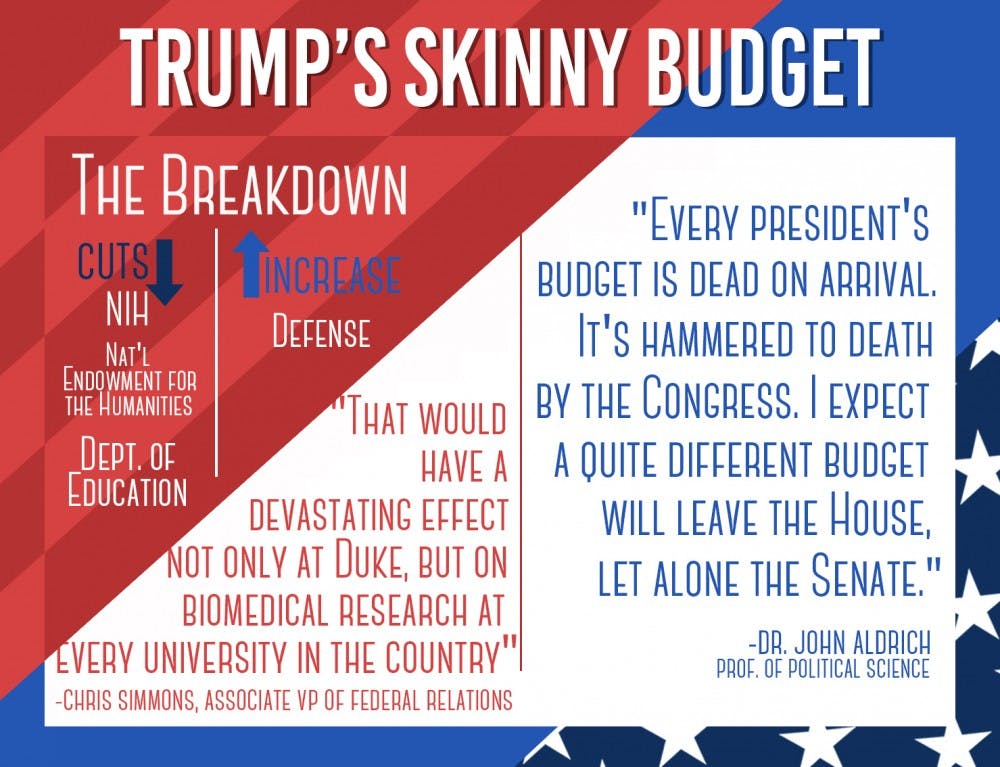Although a president’s first budget outline rarely gets passed as proposed, Trump’s plan has been particularly controversial—with potential consequences for the University.
The current budget proposal is a “skinny budget,” explained Chris Simmons, associate vice president of federal relations. It currently includes large cuts to entities like the National Institutes of Health, National Endowment for the Humanities and Department of Education, while increasing defense spending by $54 billion.
“I think the budget is a disaster, but it’s just the first step in a long process, and we’re going to work hard to rectify these issues,” Simmons said.
What the budget does
Many have questioned if the proposed budget cuts and increases have been balanced appropriately. Some say that domestic cuts exchange long-term gains for possible short-term deficit reduction.
“If you spend money in government, there’s something called the multiplier effect,” said John Aldrich, Pfizer-Pratt University professor of political science.
The "multiplier effect" is an economic theory that government spending raises income for some, thus incentivizing them to spend. Ultimately, the total increase in the country's gross domestic product should go up by more than the amount of government spending, when the theory holds true.
Although investing in defense has the lowest long-term gains, Aldrich noted that investing in education and reducing poverty have the highest. These may be the areas Trump’s budget cuts affect the most.
Aldrich also explained that even though security has three large components—the military and defense, a society’s soft power and overall quality of life—Trump is building up defense "at the great expense of the other two."
David Rohde, Ernestine Friedl professor of political science, noted that the programs Trump is trying to cut have strong constituencies behind them.
"If that weren’t true they probably wouldn’t be existing programs in the first place, and those people will fight to the nail to keep from changes," he said.
Others are skeptical the budget will pass at all.
“Every president’s budget is dead on arrival,” Aldrich said. “It’s hammered to death by the Congress. I expect a quite different budget will leave the House, let alone the Senate.”
How the budget affects Duke
For the University, Trump’s proposed cuts to entities like the NIH and the NEH would present a host of challenges.
Simmons noted that Duke is "extremely disappointed" with the president’s budget. His biggest concern is the proposed cut of $5.8 billion to the NIH, the largest public funding source for biomedical research in the world.
“That would have a devastating effect not only at Duke, but on biomedical research at every university in the country that is trying to cure diseases and things like that,” he said.
Other areas of concern for Simmons include cuts to funding sources for energy and climate research as well as the elimination of the National Endowments for the Arts and Humanities.
For some faculty, like Anne-Maria Makhulu, associate professor of cultural anthropology, these cuts hit especially close to home. Makhulu recently received a $50,000 grant from the NEH to fund her new research project called “The New Financial Elite: Race, Mobility and Ressentiment after Apartheid.”
She explained that agencies like the NEH and NEA sponsor research projects which may have a hard time securing funding from agencies more interested in quantitative methods or policy implications.
“You can get summer funding through the University, through arts and sciences, but at some point we all need to go in and do longer-term, deeper, more thoughtful work,” Makhulu said.
Luckily, Makhulu received an email March 20 from the NEH reassuring her “award is not in danger.”
Lobbying and moving forward
The University is working to prevent budget cuts that it considers harmful to students, research and innovation, Simmons said.
He noted that during the last few weeks, Duke representatives have visited the Hill to talk with members of Congress about the University’s needs. He added that he is working with other universities and coalitions “to promote a budget that supports robust investments in student aid and research.”
After the long budget approval process is over, Simmons explained that if there are any aspects in the budget that would be detrimental to research funding or students, the University would take a two-fold path forward.
Duke would do an assessment to find other means of funding for the affected programs or determine that they were not sustainable without the federal partnership.
Simmons said he would work hard to demonstrate the harm caused by the cuts during budget negotiations next year to try to get the funding back.
But Rohde noted that the president getting the exact budget plan he wants is “virtually nil.”
Both Democrats and Republicans legislators alike are "up in arms" over the budget because it cuts features important to their states, Rohde said.
Aldrich added that the budget also appears to harm blue-collar workers.
“It seems like his budget is designed to support everything except the people who voted for him,” he said.
Get The Chronicle straight to your inbox
Signup for our weekly newsletter. Cancel at any time.
Bre is a senior political science major from South Carolina, and she is the current video editor, special projects editor and recruitment chair for The Chronicle. She is also an associate photography editor and an investigations editor. Previously, she was the editor-in-chief and local and national news department head.
Twitter: @brebradham
Email: breanna.bradham@duke.edu

